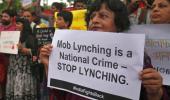Union Home Minister Amit Shah on Saturday justified the need to replace the IPC, CrPC and the Evidence Act saying any law becomes "obsolete" after 50 years.

"There has been no change in the IPC, CrPC or the Evidence Act since 1860. Any law becomes ‘obsolete' after 50 years. The scale of crime has changed, and so has the method of committing them but there has been no change in the method of dealing with them," Shah said.
Addressing the 49th All India Police Science Congress, he said this has had a crippling effect on the country's criminal justice system.
Speaking of the three new legislations -- the Bharatiya Nyaya Sanhita (to replace IPC), Bharatiya Nagarik Suraksha Sanhita (to replace CrPC) and Bharatiya Sakshya (to replace the Evidence Act) -- under consideration of a parliamentary panel, he said they will replace the three old codes once passed by the Parliament.
It will expedite disposal of cases as they won't get inordinately delayed, Shah added.
He said numerous reforms right from the home ministry to the last police station have been conceived for "Amrit Kaal" and it is the time to implement them on the ground.
The All India Police Science Congress covers six subjects, including policing in the 5G era, narcotics, challenges of social media, community policing, internal security, coordination between police and the Central Armed Police Forces, Shah said.
The scope of the subjects taken up completely cover the country's internal security, law and order, and border security, the Union home minister said.
Drawing a comparison between ten years of the UPA and nine years of the Modi government, Shah cited the substantial decline in incidents of violence in three hot spots - Jammu and Kashmir, left extremist-affected states and the north-east.
"The number of violent incidents in the three hot spots from 2004 to 2014 were 33,200, which reduced to 12,358 in nine years from 2014-2023. Even deaths of security personnel and civilians in these areas recorded a substantial decline from 11,947 to 3,240," Shah said.
Shah called for a strong and collective endeavour to achieve the prime minister's vision of making India one of the leading countries in the world by 2047, the 100th year of its independence.
"We have to work as hard as it gets in every field to achieve that goal. But the first pre-condition for development is a sound law and order scenario, internal security and the safety of our borders," he said.
The entire roadmap to achieve that goal will be laid down during the police congress, he said.











 © 2025
© 2025